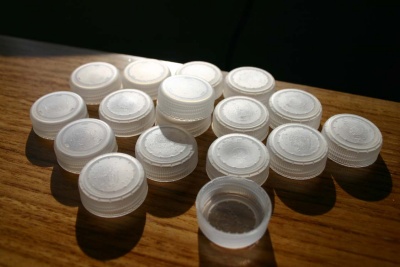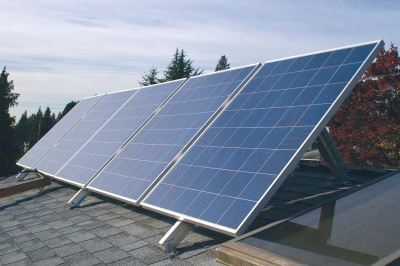 From the Editors of E/The Environmental Magazine
From the Editors of E/The Environmental Magazine
Dear EarthTalk: Everyone knows we should recycle metal, glass and plastic cans and bottles, but what about all the lids, tops and caps? I see people recycling plastic bottles, for example, with their caps on, but I've always been told to thrown them out. Is that wrong? -- Stefanie Gandolfi, Oakland, CA

Many recycling centers do not accept plastic lids, tops and caps. They are usually made of a different plastic than the containers they accompanied and can contaminate the recycling stream while also causing machine jams and injuries to workers. (Photo: GregPC, courtesy Flickr)
Many municipal recycling programs throughout the U.S. still do not accept plastic lids, tops and caps even though they take the containers that accompany them. The reason is that they are not typically made of the same kinds of plastics as their containers and therefore should not be mixed together with them.
"Just about any plastic can be recycled," says Signe Gilson, Waste Diversion Manager for Seattle-based CleanScapes, one of the west coast's leading "green" solid waste and recycling collectors, "but when two types are mixed, one contaminates the other, reducing the value of the material or requiring resources to separate them before processing."
Also, plastic caps and lids can jam processing equipment at recycling facilities, and the plastic containers with tops still on them may not compact properly during the recycling process. They can also present a safety risk for recycling workers. "Most plastic bottles are baled for transport and if they don't crack when baled, the ones with tightly fastened lids can explode when the temperature increases," says Gilson.
Some recycling programs do accept plastic caps and lids, but usually only if they are off their containers completely and batched separately. Given the many potential issues, however, most recyclers would rather avoid taking them altogether. Thus it is hard to believe but true: In most locales the responsible consumers are the ones who throw their plastic caps and lids into the trash instead of the recycling bin.
As for metal caps and lids, they, too, can jam processing machines, but many municipalities accept them for recycling anyway because they do not cause any batch contamination issues. To deal with the potentially sharp lid of any can you are recycling (such as a tuna, soup or pet food can), carefully sink it down into the can, rinse it all clean, and put it in your recycling bin.
Of course, the best way to reduce all kinds of container and cap recycling is to buy in large rather than single-serving containers. Does the event you're holding really require dozens and dozens of 8- to 16-ounce soda and water bottles, many of which will get left behind only partly consumed anyway? Why not buy large soda bottles, provide pitchers of (tap) water and let people pour into re-usable cups?
The same kind of approach can be taken with many if not all of the bottled and canned grocery items we buy routinely for the home. If more people bought in bulk, apportioning out of larger, fewer containers, we could take a huge bite out of what goes into the waste stream.
CONTACT: CleanScapes, www.cleanscapes.com .
Dear EarthTalk: I am considering solar panels for my roof to provide heat for my hot water and possibly to do more than that. Are there some kinds of solar panels that are better than others? How do I find a knowledgeable installer? -- Elise, Watertown, MA

Some 17 states now offer homeowners tax rebates or incentives for the purchase and/or installation of solar power equipment, including rooftop solar collectors for home heating or hot water. (Photo: Rob Baxter, courtesy Flickr)
What type of solar energy capture system you put on your home depends on your needs. If you want to go full tilt and generate usable electricity from your home's rooftop-and even possibly contribute power back to the larger grid-tried and true photovoltaic arrays might be just the ticket. A typical installation involves the panels, which are constructed of many individual silicon-based photovoltaic cells and their support structures, along with an inverter, electrical conduit piping and AC/DC disconnect switches.
These systems can cost tens of thousands of dollars to install, and as such may not pencil out for those looking for the cheapest power solution. But the upside is that homeowners with photovoltaic panels on their rooftops can rest assured that as long as the sun shines, they will have power to spare without generating emissions of carbon dioxide and other noxious pollutants.
Qualified solar installers can usually advise clients on which specific types of systems will work best given the specific location of a home. U.S. homeowners can find qualified photovoltaic installers via the website FindSolar.com. And the North American Board of Certified Energy Practitioners (NABCEP) provides a free searchable database of its U.S. and Canadian members specializing in home solar set-ups.
For less demanding applications, such as for heating water for your home or swimming pool, a much simpler (and less expensive) solar thermal system might be all you need. A basic hot water system usually consists of a solar collector-basically a small metal box with a glass or plastic cover and a black copper or aluminum absorber plate inside-tied into the building's plumbing and electrical works. According to the industry tracker website Solarbuzz, such solar collectors are usually mounted on rooftops.
Professional installers can get your home up and running with a solar thermal system for less than $4,000 in most cases. While the savings in your electric bill may be small, homeowners in it for the long haul will definitely save over time, all the while enjoying the fact that you have lowered your family's carbon footprint significantly.
Homeowners looking to find out more about residential solar systems should be sure to check out the RealGoods Solar Living Sourcebook, a 600+ page renewable energy "bible" now in its 30th edition. The book features the latest nuts-and-bolts information on how to harvest renewable energy in a variety of ways depending on need. And RealGoods also sells much if not all of the equipment needed.
Another reason to consider going solar in one fashion or another is tax incentives. According to the Database of State Incentives for Renewables and Efficiency (DSIRE), 17 states now offer homeowners some kind of tax rebate or incentive for the purchase and/or installation of solar power equipment of any kind. You can see what if any your state offers by logging onto the dsireusa.org website, where the searchable database is available in its entirety for free.
RELATED INFORMATION: Maryland Awards Record Grants For Residential Solar, Geothermal Energy, Aug. 17, 2008
CONTACTS: Solarbuzz, www.solarbuzz.com ; FindSolar.com, www.findsolar.com ; NABCEP, www.nabcep.org ; RealGoods, www.realgoods.com ; DSIRE, www.dsireusa.org .
GOT AN ENVIRONMENTAL QUESTION? Send it to: EarthTalk, c/o E/The Environmental Magazine, P.O. Box 5098, Westport, CT 06881 or e-mail: earthtalk (at) emagazine.com.


